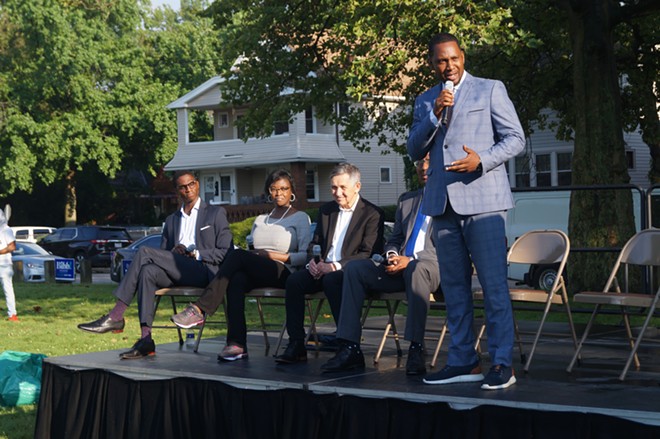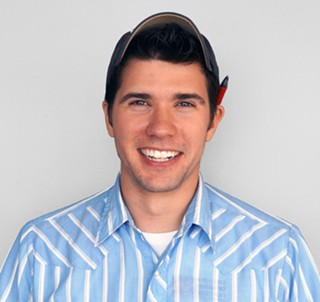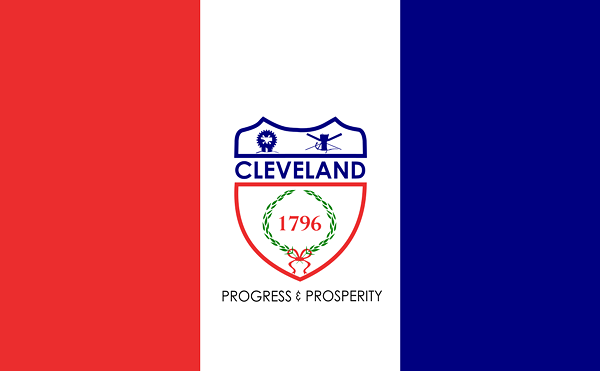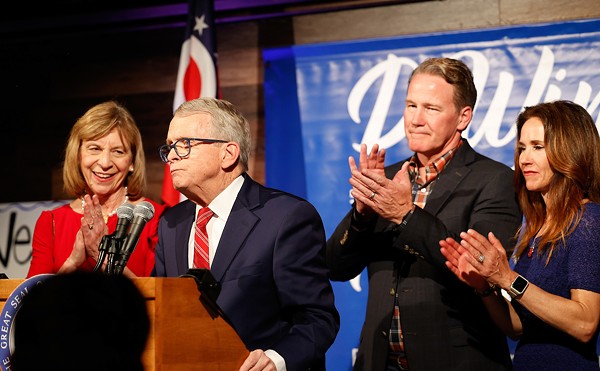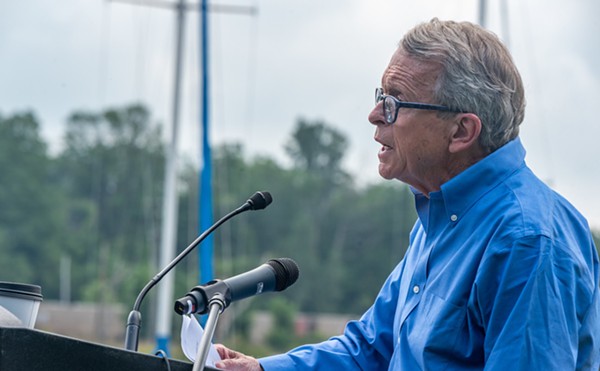Winners and Losers from Mayoral Forum in West Park: Young Bucks vs. Old Farts Edition
By Sam Allard on Fri, Jul 9, 2021 at 12:16 pm
[
{
"name": "Ad - NativeInline - Injected",
"component": "38482495",
"insertPoint": "3",
"requiredCountToDisplay": "5"
},{
"name": "Real 1 Player (r2) - Inline",
"component": "38482494",
"insertPoint": "2/3",
"requiredCountToDisplay": "9"
}
]
The sun emerged over Jefferson Park Thursday evening after a brief hard rain to make way for the most exciting event of the 2021 Cleveland mayoral race to date. All seven candidates, now fully in campaign mode, proved that the race to succeed Mayor Frank Jackson is wide open.
Hosted and moderated by west side councilmen Brian Kazy and Charles Slife, who represent wards 16 and 17, respectively, the forum covered a range of interrelated topics that largely focused on city services, from street resurfacing to the lapsed recycling program to public safety.
The forum was held outdoors, with a few dozen residents and supporters gathered in lawn chairs to hear the memorized talking points and extemporized one-liners of the hopefuls. Though it was not billed as a "debate," the event featured an array of barbs and clapbacks that one would expect on a competitive campaign trail and some of the most pointed individual questions that have yet been posed.
The big winner, in this respect, was the City of Cleveland, whose residents can rest assured that their city is, at last, the venue for a legitimate political contest. The primary elections are Sept. 14, after which the top two vote-getters will square off in the November general. Predicting winners is no less of a crapshoot today than it was yesterday.
As in previous columns, the below is my best attempt, a few hours removed, to separate those who performed strongest from those who came up short. Unlike in 2017, where incumbent Frank Jackson didn't even bother to attend the summer forums, no candidate bombed completely or presented as someone who did not belong. There were moments of coherence and even persuasiveness from virtually all of them. Still, a few performances were notable, and a few themes concretized in my mind by evening's end.
(NB: I hope it's superfluous to note that these are merely my impressions. The "winners" and "losers" framing is for ease and does not connote any actual victory or defeat. Nor does it connote any enduring preference. A "winner" today could be a "loser" next week.)
WINNER: Basheer Jones
Far and away the evening's best showing belonged to Ward 7 Councilman Basheer Jones. I have called Jones the race's premier orator, and he quickly earned the tag Thursday, once again distinguishing himself from the pack via his ease and power on the mic. He's a natural speaker in a way that Justin Bibb and Kevin Kelley, for example, simply are not. (Substance of their comments notwithstanding, those two often sound like they're reciting a script.)
Whether it's gleaned from the radio studio or the pulpit, Jones has mastered a way of communicating that feels almost covert, like he's letting you in on secrets, in this case peeling back the veil of city government. The double-whammy effect, Thursday, was that he could expose incompetence and promote transparency simultaneously, all while remaining upbeat. He had a moment where he invited the crowd to submit public records requests for email correspondence between council members and various city departments, which he said would demonstrate how difficult it was even for them to acquire basic information.
Jones owned the evening's two best and most meaningful moments, neither of which were scripted. The first was during a question posed to him about a recent video which showed him saying, "women are not our leaders." He explained the context of his remarks — he said he was addressing men in his community about the scourge of violence, trying to empower them to protect the women and children in their midst — but brought the conversation back to public safety. He stressed that hiring more police officers would not magically reduce crime, as others on stage seemed to think. He cut through the unchallenged consensus, in other words, with some real talk. He said that while in some neighborhoods, more officers might make residents feel safer, in other neighborhoods the effect would be the opposite. Without naming names, Jones said that his opponents were using language to stir up fear based on preconceived ideas (ahem, racism), but that the city and its public safety responses were complex. You can't necessarily apply the same solution in Kamm's Corners that you can in Glenville. It was a moment of clarity and correction that — at least in my peripheral vision — had a bunch of folks nodding along appreciatively.
But the biggest moment, which represented to me and just about everyone in attendance the event's climax, was after Zack Reed had whipped out his phone and accused Jones of wanting to defund the police. Reed was referencing Jones' appearance at the City Club of Cleveland, when he'd responded to a quote by Gov. Mike DeWine that defunding the police was "absurd." "It's definitely not absurd," Jones said then. Reed treated the moment as a gotchya, keen to isolate Jones as either a liar or a flip-flopper after he'd earlier stated that "no one on this stage is talking about defunding the police."
Jones spoke next. These were meant to be the candidates' closing arguments.
"Now if we start Googling Zack," he quipped, good-naturedly, "you know what's gonna happen. So we're not gonna do that right now."
Laughter. Applause. Hooting. Hollering. Etcetera. A clean and sharp retort that made Reed look foolish and Jones look dignified. The crowd was instantly on his side. But then Jones took it one step further.
"That's the issue with our city, by the way," he said. "You have older Black leadership who attack the new young Black leadership. That's why you're not gonna catch me attacking Bibb. He and I have the same mission to make this city better, even if we're riding in different cars. These old Black leaders tearing down young Black leaders — they're stepping on caterpillars as if the sky is not big enough for all the butterflies."
My goodness. The Bibb section might have been cheering even louder than the Jones section after that graceful exegesis, so profoundly did the message resonate. When Jones sat down, Ross DiBello, seated at the end of the candidates' platform, reached behind Kevin Kelley to offer a comradely fist bump. Everyone seemed to recognize that this was the evening's big moment, and perhaps a pivotal moment in the primary's early going.
LOSER: Dennis Kucinich
On the heels of, let's face it, a successful publicity stunt with the script Cleveland signs, Kucinich asserted himself even more forcefully as the candidate for whom public safety is the preeminent issue.
"The noise that people are hearing in Cleveland neighborhoods is not planes," he said at one point, as an airplane flew low overhead, "but gunshots."
Kucinich pounced on every question as an opportunity to reiterate that the City of Cleveland had $40 million in a rainy day fund and $30 million in unencumbered general fund dollars that could be used to hire 400 new police officers and 100 new assistants trained as interventionists for mental health calls.
Kucinich is a veteran on the campaign trail and has experience behind a mic as well, obviously. But where Jones seemed natural, Kucinich seemed theatrical. The dramatic pauses before every answer became almost ritualistic by the forum's conclusion. And the well-tread stories of his penny-counting parents and his sensitivity to the plight of Black people due to his growing up in Black neighborhoods scanned as stage monologues. (When he quoted Langston Hughes — "life for me ain't been no crystal stair" — and discussed his impoverished youth, did I detect — gulp — something like a "Black voice"?) Cringy stuff regardless.
The former mayor and congressman is at his best when discussing the special interests that control the levers of power. And during a question about "customer service" at City Hall, Kucinich artfully reframed the underlying assumption — "city government isn't working" — into a more accurate diagnosis: city government is working, just not for you.
Yes! That's the Dennis that so many Clevelanders know and love. And yet his insistence on warping democratic principles into fear-mongering about violence is the sort of thing that people detest most about election season.
I actually view the Dennis and Kevin Kelley campaigns through roughly the same lens in that sense. Both are cynically deploying campaign rhetoric that people recognize as vast departures from their records and vibes: No one actually believes Kelley cares about listening to residents, for example, or that he's a trailblazer for racial justice. That's entirely a curated image for the election. But this is why Kelley talks nonstop about council's declaration of racism as a public health crisis and its right to counsel legislation as if Kelley and Kelley alone were responsible for them. (We reported more than a year ago that Kelley would attempt to rehab his image for his mayoral run.) You don't hear him celebrating the Q Deal or his efforts to quash the Fight for 15, though those are his actual legacies. That's how elections work. Candidates say what they think will get them the most votes, regardless of their beliefs.
It seems to be much harder for folks to grasp in the case of Kucinich, but this is what he's up to as well: He is not actually a raving Blue Lives Matter partisan who wants to militarize every city street corner, though that's how he sounds. His "bold" stance to oppose the Citizens for a Safer Cleveland initiative and his constant references to raining bullets and the terror of violence in the neighborhoods is cold, strategic, cynical electioneering.
WINNER: The Young Bucks
The evening's energy was undeniably on the side of Basheer Jones, Justin Bibb and even plucky Ross DiBello, the lone male candidate without a sport coat or suit jacket. Dramatized by Jones' final speech, the divide between the younger, fresher faces, and the aging (or downright old) has-beens couldn't have been starker.
The contingents of supporters for Bibb and Jones were the largest, with their yard signs marking the perimeter of Jefferson Park. And while Bibb was handicapped early on by his placement in the line-up — he was the first to introduce himself, the first to answer an individual question and the first to lead off a group question — he recovered with his familiar, easily digestible talking points about the need for modern-day competence at City Hall. The 21st century is calling, Bibb continued to assert, and he was the candidate who was equipped to answer the telephone.
The DiBello ethos rocks. People love this guy, even if they might not vote for him. Unlike Bibb and Jones, DiBello arrived solo, with zero identifiable supporters and zero signs, a dynamic that, alongside his broken microphone, reinforced his one-man-versus-the-system mentality.
DiBello is a guy who's happy to be there, but who has worked exceedingly hard to do so. When asked why Clevelanders should have confidence in his ability to lead, he said, word for word: "My work ethic, physically, mentally, my cooperation skills. I've played in the World Series of Poker." Hell yes, Ross.
But joke candidate DiBello is not. He continually connects the dots between corporate handouts and the city's poverty and proposes systemic changes to legislative policies that have long insulated established power. His closing argument even had a heroic whiff, animated by his personal quest to gather petition signatures:
"I don't know that any of these six candidates up here could have went out and collected 3,850 signatures [on their own]," he said. "I'd have gotten 5,000. I'd have gotten 7,500. I was getting on the ballot for anybody in Cleveland who feels unheard, for anybody who's wondering what the hell they're getting for their tax dollars, for anybody who wants to stop prioritizing billionaires and how they feel and how many houses they own in Florida. I was getting on the ballot for us, for the public comment people, for the participatory budgeting people, for CLASH — not Council President Kelley's Lead Safe Initiative — I was getting on the ballot for you guys and I would've gotten whatever it took."
LOSER: The Old Farts
Sandra Williams and Kevin Kelley failed to make much of an impression. Williams' strongest answer was about EMS and the ways the city sabotages itself by offering non-competitive wages and makes EMS workers pay for their own training. But she didn't attack (or even critique) any of her competitors or present a vision for the city's future beyond, "If I say I'm going to do something, I do it." In response to a (very good) question about her sponsorship of HB6 and her donations from FirstEnergy as a state legislator and why, given this track record, residents should feel confident in the future of Cleveland Public Power, Williams offered a weak deflection. She said that other Democrats voted for HB6 too and that she received donations from all sorts of organizations other than FirstEnergy. CPP would not be sold on her watch, she promised.
Kelley promoted his leadership on street resurfacing, which resulted in significant increases in dollars for road repairs citywide, but his opening and closing remarks — about making sure the city's recovery from Covid included everybody — struck a generic and false note, a distant cousin of Frank Jackson's endless "least of us" refrain. Kelley was also clearly bothered that his opponents were veering from the questions asked by the moderators. One suspects he is so accustomed to chairing meetings as the head of city council that he feels especially powerless on a level playing field.
Reed was on the warpath, exchanging zingers throughout the night with Justin Bibb, whom he accused during closing remarks of actually hailing from Union-Miles, not Mt. Pleasant. (Bibb's grandmother, who was in attendance, was name dropped more times than any candidate on stage.) Reed reverted to a number of tropes from his 2017 campaign, including the recitation of homicide numbers and his proposal to open City Hall on Saturdays for office hours. To his chagrin, if his performance is remembered at all, it'll be for the Basheer Jones exchange, in which he served as the joke's unhappy and unwitting butt.
WINNER: Brian Kazy and Charles Slife
The city's press corps is officially on notice. Two councilmen just organized and executed the most substantive and entertaining political forum of the year. Both the format — back and forth between general questions in rotating round-robin sequence and individual questions — and content invited lively and revealing answers from the candidates, and gave them all equal opportunities to comment. The event ended precisely on schedule.
Brian Kazy, who asked the individual questions, did so without bias or emotion, forcing the candidates to address the material directly. These questions were more adversarial (and more interesting) than the bland introductory fare in evidence at the campaign launches. Kazy and Slife seemed to intuitively understand that general questions are best used to solicit and clarify the candidates' opinions on assorted topics of interest, whereas individual questions are best used to address specific controversies and or perceived shortcomings. Kelley was asked why voters should believe he can forge a new path when he hasn't bothered to forge one during his 16 years on city council, for example. Kucinich was asked why voters shouldn't expect the calamities that tend to follow him wherever he goes. Bibb was asked about his support for Citizens for a Safer Cleveland and how he could justify yet another body tasked with police oversight.
Though the early general questions overlapped slightly — city services, recycling, customer service at City Hall — the topics expanded and ultimately interacted well with the individual ones.
Kazy concluded with a warning to candidates not to forget West Park as they continued their campaigns. Given that Ward 17 is historically one of the two highest-voter-turnout wards in Cleveland elections, there's little danger of that.
***
Sign up for Scene's weekly newsletters to get the latest on Cleveland news, things to do and places to eat delivered right to your inbox.
SCENE Supporters make it possible to tell the Cleveland stories you won’t find elsewhere.
Become a supporter today.
About The Author
Sam Allard
Sam Allard is the Senior Writer at Scene, in which capacity he covers politics and power and writes about movies when time permits. He's a graduate of the Medill School of Journalism at Northwestern University and the NEOMFA at Cleveland State. Prior to joining Scene, he was encamped in Sarajevo, Bosnia, on an...
Scroll to read more Cleveland News articles
Newsletters
Join Cleveland Scene Newsletters
Subscribe now to get the latest news delivered right to your inbox.

